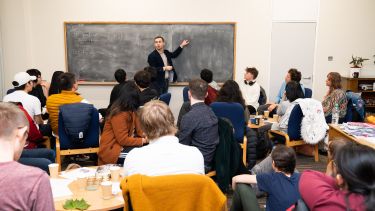Statistics Graduate Certificate
School of Mathematical and Physical Sciences ,
Faculty of Science
-
Start date
September 2025 -
Duration
9 months -
Attendance
Part-time Distance learning
Explore this course:
Book now for our online postgraduate open day on Wednesday 30 April 2025.

Course description
Our Statistics Graduate Certificate is designed for graduates who don't have all the background knowledge for a masters degree in statistics. Students who perform well can progress on to our Statistics MSc.
This nine-month part-time distance learning course runs from late September until early June, with all teaching and exams held online. You'll need to dedicate around 20 hours a week to your studies.
You’ll take three core modules that cover the relevant first-year undergraduate mathematics, and the relevant first and second-year probability and statistical theory.
Progression
An average final mark of approximately 65 per cent on the Graduate Certificate, with at least 60 per cent in each of the three modules, will usually allow you to progress onto the Statistics MSc, provided you meet the University's English language requirements.
Modules
Core modules:
- Mathematical Methods for Statistics
-
The module is a distance-learning instrument aimed at graduates who wish to undertake a postgraduate Masters course in Statistics but lack the appropriate mathematical and statistical background. It introduces the mathematical concepts and methods needed for such a masters course and gives training in their use. It covers ideas and techniques from real analysis and linear algebra, including multiple integration and differentiation and matrix algebra and the theory of quadratic forms.
20 credits - Probability and Probability Distributions
-
The module is a distance-learning instrument aimed at graduates who wish to undertake a postgraduate Masters course in Statistics but lack the appropriate mathematical and statistical background. It introduces the concepts of probability theory and distribution theory needed for such a masters course, and gives training in their use. It covers the laws of probability and of conditional probability, the concepts of random variables and random vectors and their distributions, and the methodology for calculating with them. It also discusses Laws of Large Numbers and Central Limit phenomena
20 credits - Basic Statistics
-
The module is a distance-learning instrument aimed at graduates who wish to undertake a postgraduate Masters course in Statistics but lack the appropriate mathematical and statistical background. It introduces the basic concepts of statistical inference and of rational decision-making under uncertainty, and it demonstrates how they may be applied in a wide range of practical circumstances. Implementation of the methodology with appropriate software forms an integral part of the unit.
20 credits
The content of our courses is reviewed annually to make sure it's up-to-date and relevant. Individual modules are occasionally updated or withdrawn. This is in response to discoveries through our world-leading research; funding changes; professional accreditation requirements; student or employer feedback; outcomes of reviews; and variations in staff or student numbers. In the event of any change we will inform students and take reasonable steps to minimise disruption.
Open days
Become part of our community of talented postgraduate taught students. Register now to join us at our online open day on Wednesday 30 April 2025.
Duration
Nine months, part-time – you'll need to dedicate around 20 hours a week to your studies
Teaching
Depending on the module, you'll either be given directed reading from standard textbooks or a fully comprehensive set of course notes. You’ll also receive examples and exercises to work through. Tailored course material will be made available online including additional notes and video lectures. Each module has an online forum for discussions and our lecturers will give you feedback and comments on your work.
Assessment
Around 20 per cent of your assessment will be based on coursework, with the rest based on your final exams.
Your career
This course is designed to prepare you for a masters degree in statistics here at the University of Sheffield.
Employers that have hired our graduates include Amazon, Barclays, Dell, Goldman Sachs, IBM, PwC, Sky, the NHS and the Civil Service.
School
School of Mathematical and Physical Sciences
The School of Mathematical and Physical Sciences is leading the way with groundbreaking research and innovative teaching.
Our mathematicians and statisticians have expertise across pure mathematics, applied mathematics, probability and statistics. We focus on a variety of topics, from the most abstract questions in algebraic geometry and number theory, to the calculations behind infectious disease, black holes and climate change.
In the Research Excellence Framework 2021, 96 per cent of our mathematical sciences research was rated in the highest two categories as world-leading or internationally excellent.
We have strong links with the Society for Industrial and Applied Mathematics, the Institute of Mathematics and its Applications, the European Physical Society, and the International Society on General Relativity and Gravitation. With the support of the London Mathematical Society, we are also an organiser of the Transpennine Topology Triangle, a key focal point for topology research in the UK.
Mathematics and statistics staff have received honours from the Royal Society, the Society for Mathematical Biology and the Royal Statistical Society, who also provide professional accreditation for our statistics courses.
Entry requirements
Minimum 2:2 undergraduate honours degree in a relevant subject and at least grade B in A Level mathematics, or equivalent.
Subject requirements
We accept degrees in the following subject areas:
- Biochemistry
- Biomedical Science
- Computer Science
- Economics
- Medicine
- Engineering
We may consider other quantitative degree subjects.
English language requirements
IELTS 6.5 (with 6 in each component) or University equivalent
If you have any questions about entry requirements, please contact the school/department.
Fees and funding
Alumni discount
Save up to £2,500 on your course fees
Are you a Sheffield graduate? You could save up to £2,500 on your postgraduate taught course fees, subject to eligibility.
Apply
You can apply now using our Postgraduate Online Application Form. It's a quick and easy process.
Contact
Any supervisors and research areas listed are indicative and may change before the start of the course.
Recognition of professional qualifications: from 1 January 2021, in order to have any UK professional qualifications recognised for work in an EU country across a number of regulated and other professions you need to apply to the host country for recognition. Read information from the UK government and the EU Regulated Professions Database.

